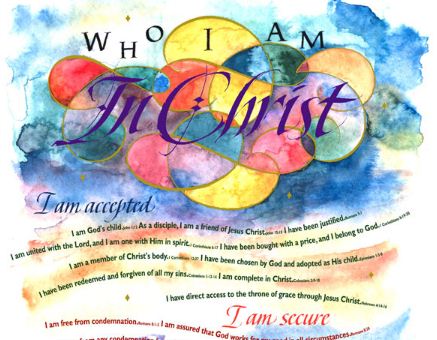Who I am in Christ
In a world that is being shaken, the question of where our security resides comes under scrutiny. When the status quo is challenged it can reveal where our dependency truly lies; and constitute a threat to our very identity.
first published 21/12/2011
But whatever was to my profit I now consider loss for the sake of Christ.
What is more, I consider everything a loss compared to the surpassing greatness of knowing Christ Jesus my Lord, for whose sake I have lost all things. I consider them rubbish, that I may gain Christ and be found in him.." The apostle Paul (Phil. 3:4-9)
 Preamble Preamble
‘Who I am in Christ’ is the title of a book by Neil Anderson, and – although I haven’t read it – this is the theme of an article that has been rattling around in my head for many years. It’s something that I have been planning to write about for a long time, but it never quite arrived at the ‘top of the heap’. However two things have come into coincidence this morning which prodded me into getting down to the task.
The first ‘prod’ is the desire and ambition, as we move into a new year, to publish an article (on quite a different subject) which needs to be preceded by this one (See footnote.) The second prompt was the arrival of the postman with a mailing from a friend a couple of days ago which included a very short extract from Anderson’s book. (Sent incidentally with no knowledge of what had been going on in my head.)
So, with the clock now ticking towards a new year, here goes.
Who am I?
Having learned from psychologists, worked with a psychology graduate and led parent-support groups for some years I have come to learn, if I didn’t know already that “Who am I?” is the first and most fundamental of questions that arises in the human soul?
The question, shaped in the womb, is straightforward:
|
" Where did I come from? Who do I belong to? Who loves me? What am I worth?" |
yet the answers, humanly-speaking, are complex. Amongst those who study these things, the respective but discrete influences of ‘nature’ and ‘nurture’ (our genes and our environment respectively) are, and will be debated until Kingdom come. Meanwhile time and time again, parents would say to me that the problem most afflicting their children was ‘lack of self-esteem’.
To travel some way towards addressing the question or our individual identity, we ask ourselves some other questions: “Where did I come from? Who do I belong to? Who loves me? What am I worth?” And in a sense this is where the trouble starts, as the answers to all of these questions are usually derived from our external environment – our surroundings sending ‘signals’ which are often distorted and based on human measures and attitudes.
A television advert some years ago spoke of ‘the clothes you wear; the people you’re seen with; the car you drive’, as defining the person. How sad.
Yet the search goes on. And in order to find some other answers to the question of ‘identity’, we might look at our blood-line, ancestry, parentage, gender, skin colour, intellectual ability, athletic prowess, looks, affinities, interests, etc.
Company men (and women)
Country singer Tennesse Ernie Ford used to sing a song about an American miner. The first verse reflects on ‘identity’:
“Some people say a man is made outta mud
A poor man's made outta muscle and blood
Muscle and blood and skin and bones
A mind that's a-weak and a back that's strong.
The miner may consider himself poor and dim-witted, but he is, as Samson was, 'strong'. The chorus is a mix of melancholy, pragmatism and spirituality:
'You load sixteen tons, what do you get
Another day older and deeper in debt
Saint Peter don't you call me 'cause I can't go
I owe my soul to the company store.'
While the workman, in that last line, links his 'soul' to his employer in terms of debts, there are many, or so it would seem today, whose self-image is bound up with their work; with personal identity being wrapped up in their organisation (whether commercial, social or even religious); or their position in the pecking order and (the all-important) job title. For those who are employed within in largish organisations their ‘soul’, like the miner in the song, seems to be tied to the ‘company’.
I worked for many years within a large organisation. It was a good organisation, and generally operated in an efficient and effective manner. However like many organisations it also had its weaknesses. And this is where – in ‘coffee-break’ conversations – trouble could erupt. One employee could give voice to a valid criticism of the company (with which most others would agree). But there was sometimes one person (or another) who would suddenly get very upset with the critic and what was being said.
The root is insecurity...even in the church
It was most often the case that the angry colleague had his identity so bound up with the organisation for which he worked, that any criticism of the company was perceived as an attack on the person; an assault on his self-image; a strike at his very being. And of course the same can be found in other environments, including sport. It’s tribalism in the raw. But its root is insecurity.
And all of these dynamics concerning personal identity can be found within all spheres including the church(es):
-
party spirit (1 Cor 1:12)
-
status-seeking (3 John 9)
-
pride of position (Luke 20:46)
-
pride of learning (Matt 23:5 )
-
in size of following (2 Sam 24:1)
-
in achievement (Gen 11:4)
These things are manifest in all manner of ways which do not require keen powers of observation to identify.
What makes this so very sad is when these things are apparent amongst those whose worth, status and security should lie in the knowledge – most importantly in the heart as well as the head – that Christ died for each and every one. That the answer to “Who I am” is that of being a blood-bought brother or sister of Christ, and a child of the living God; part of the royal priesthood of all believers; accepted and loved by the Lord and maker of all heaven and earth.
A summation of a summation
For the last three years our home has had to accommodate the reading material for a doctoral thesis in psychology. The books – in terms of weight and volume – have been mountainous. Pages running into tens of thousands; and words by the millions. The thesis - addressing just one facet of the human condition - ran to 35,000 words.
 Yet allow me to copy (below) just 225 words from a Christian source and penned by a noted mental health physician. After fifty years of practice, dealing with all kinds of mental and emotional problems, Dr. James C. Fisher wrote: Yet allow me to copy (below) just 225 words from a Christian source and penned by a noted mental health physician. After fifty years of practice, dealing with all kinds of mental and emotional problems, Dr. James C. Fisher wrote:
I dreamed of writing a handbook that would be simple, practical, easy to understand, easy to follow. It would tell people how to live - what thoughts and attitudes and philosophies to cultivate, and what pitfalls to avoid in seeking mental health.
I attended every symposium it was possible for me to attend and took notes on the wise words of my colleagues who were leaders in their field. And quite by accident 1 discovered that such a work had been completed!
If you were to take the sum total of all authoritative articles ever written by the most qualified of psychologists and psychiatrists on the subject of mental hygiene -
if you were to combine them and refine them and cleave out the excess verbiage -
if you were to take the whole of the meat and none of the parsley,
and if you were to have these unadulterated bits of pure scientific knowledge concisely expressed by the most capable of living poets -
you would have an awkward and incomplete summation of the summation of the Sermon on the Mount. And it would suffer immeasurably through the comparison.
The recently-published thesis entitled ‘It’s tough being a boy’ runs to 35,000 words, yet Jesus’s ‘Sermon on the Mount’ (Matt Chs. 5:1 – 7:29) consists of a (mere) 2,480 words. Of these, Dr. Fisher concluded:
For nearly two thousand years the Christian world has been holding in its hands the complete answer to its restless and fruitless yearnings. Here... rests the blueprint for successful human life with optimum health and contentment.
--------------
The following is taken from the above-mentioned extract sent to me the other day. The text can also be found in a very helpful workbook entitled 'Steps to Freedom in Christ'.

Who I am in Christ
I Am Accepted in Christ
I am God's child (John 1:12 )
I am Christ's friend (John 15:15)
I have been justified (Romans 5:1)
I am united with the Lord and one with Him in spirit (1 Cor. 6:17)
I have been bought with a price; I belong to God (1 Cor. 6:20)
I am a member of Christ's Body (1 Cor. 12:27)
I am a saint (Eph 1:1)
I have been adopted as God's child (Eph 1:5)
I have direct access to God through the Holy Spirit (Eph 2:18)
I have been redeemed and forgiven of all my sins (Col. 1:14)
I am complete in Christ (Col. 2:10)
I Am Secure in Christ
I am free forever from condemnation (Rom. 8:1,2)
I am assured that all things work together for good (Rom. 8:33,34)
I am free from any condemning charges against me (Rom 8:28)
I cannot be separated from the love of God (Rom 8:35)
I have been established, anointed and sealed by God (2 Cor. 1:21)
I am hidden with Christ in God (Col. 3:3)
I am confident that the good work God has begun in me will be perfected (Phil. 1:6)
I am a citizen of heaven (Phil 3:20)
I have not been given a spirit of fear, but of power, love and a sound mind (2 Tim 1:7)
I can find grace and mercy in time of need (Heb. 4:16)
I am born of God and the evil one cannot touch me (1 John 5:18).
I Am Significant in Christ
I am the salt and light of the earth (|Matt. 5:13,14).
I am a branch of the true vine, a channel of His life (John 15:1,5).
I have been chosen and appointed to bear fruit (John 15:16).
I am a personal witness of Christ's I am God's temple (Acts 1:8).
I am a minister of reconciliation I am God's coworker (1 Cor. 3:16).
I am seated with Christ in the heavenly realm (2 Cor. 5:17-20).
I am God's workmanship (Eph. 2:10)
I may approach God with freedom and confidence (Eph 3:12).
I can do all things through Christ who strengthens me (Phil. 4:13).
And THAT is who we each are in Christ.
-------------------------------
Footnote: The succeeding article which I have been encouraged by a site member to write is on the issue of 'partiality' in the church (typically James 2:1-7).
|